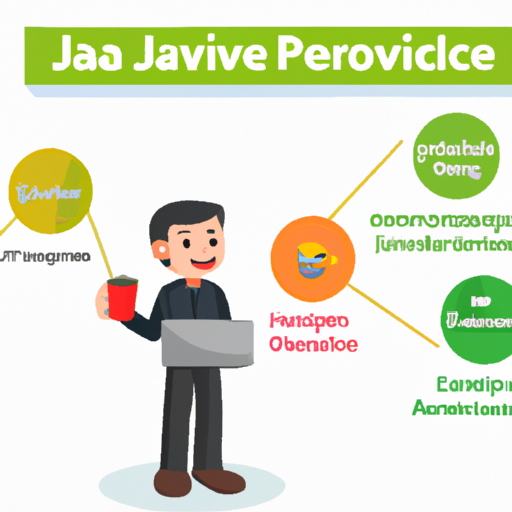The Java programming language has established itself as a cornerstone in the world of software development, serving as the foundation for countless applications and systems. As the demand for Java-based solutions continues to surge, so does the need for skilled professionals who can harness its power. A crucial player in the realm of computer science, the Java developer plays a vital role in designing, developing, and maintaining software using the Java platform. This article aims to provide an in-depth exploration of the Java developer job description, highlighting the key responsibilities, required skills, and potential career paths associated with this sought-after position. Whether you are an aspiring programmer or an industry expert, delving into the intricacies of this role will equip you with valuable insights into the world of Java development.
Table of Contents
- Responsibilities of a Java Developer
- Required Skills and Qualifications for a Java Developer
- Technical Expertise for Java Development
- Experience with Java Frameworks and Libraries
- Understanding of Object-Oriented Programming
- Collaboration and Communication as a Java Developer
- Testing and Troubleshooting in Java Development
- Continuous Learning and Adaptability in Java Development
- In Conclusion

Responsibilities of a Java Developer
A Java developer is responsible for developing and maintaining Java applications and software solutions. They play a crucial role in the design, development, and implementation of Java-based applications, ensuring they meet clients’ requirements and industry standards. Here are the primary :
- Collaborating with cross-functional teams: Java developers work closely with other team members, such as software engineers, project managers, and quality assurance analysts, to understand project specifications and ensure the effective development of Java applications.
- Writing efficient and scalable code: It is the responsibility of a Java developer to write clean, well-structured, and efficient code that is reusable and scalable. They should follow coding best practices and conduct code reviews to maintain high-quality standards.
- Debugging and troubleshooting: Java developers are responsible for identifying and resolving any defects or bugs in the application code. They employ debugging tools and techniques to diagnose and fix issues, ensuring the application performs optimally.
- Testing and quality assurance: Java developers participate in the testing process to ensure the functionality and performance of the developed applications. They collaborate with the quality assurance team to create and execute test plans, perform unit testing, and address any identified issues.
Additionally, Java developers are expected to stay updated with the latest industry trends and technologies related to Java development. They should continually enhance their skills and knowledge to deliver innovative and efficient solutions using Java language and frameworks.

Required Skills and Qualifications for a Java Developer
When it comes to hiring a Java Developer, there are certain skills and qualifications that are crucial for success in this role. A strong understanding of Java programming language is paramount, along with proficiency in Java frameworks such as Spring or Hibernate. The ability to write clean, efficient, and well-documented code is essential, as is a solid understanding of object-oriented programming concepts and design patterns.
In addition to technical skills, a Java Developer should also possess excellent problem-solving abilities and a keen attention to detail. Effective communication skills, both written and verbal, are important for collaborating with other team members and stakeholders. Experience working with databases, such as MySQL or Oracle, and familiarity with web development technologies such as HTML, CSS, and JavaScript, can also be advantageous in this role. A bachelor’s degree in computer science or a related field is typically required, although equivalent experience may also be considered.

Technical Expertise for Java Development
As a Java developer, you will be responsible for creating, coding, and implementing software solutions using Java programming language. To excel in this role, a deep understanding and technical expertise in Java development is essential. Your main tasks will involve developing and maintaining high-quality software applications, collaborating with cross-functional teams, and ensuring efficient performance and optimization of Java-based programs.
Here are the key technical skills required to be a successful Java developer:
- Proficiency in Java: You should have a strong command over Java programming language including its syntax, data structures, and design principles. An in-depth understanding of object-oriented programming (OOP) concepts, such as inheritance, polymorphism, and encapsulation, is crucial.
- Experience with Java frameworks: Familiarity with popular Java frameworks like Spring, Hibernate, or JavaServer Faces (JSF) is highly desirable. Knowledge of these frameworks enables you to build robust and scalable applications with ease.
- Database management: Understanding and experience in working with relational databases, such as MySQL or Oracle, is essential. You should be proficient in writing efficient SQL queries, stored procedures, and have a grasp of database design principles.
Experience with Java Frameworks and Libraries
As a Java developer, a key requirement for this position is having experience with various Java frameworks and libraries. These tools are essential in developing efficient, reliable, and scalable software applications. Here’s a glimpse of the frameworks and libraries we work with:
Spring Framework: Our team extensively utilizes the Spring Framework for building enterprise-level applications. With its powerful features like dependency injection and aspect-oriented programming, Spring simplifies the development process and enhances code maintainability. We expect our Java developer to have a strong grasp of the Spring Framework and its modules, such as Spring MVC, Spring Boot, and Spring Security.
Hibernate: A widely-used Object-Relational Mapping (ORM) library, Hibernate enables seamless communication between Java applications and relational databases. Experience with Hibernate is important for developing robust data access layers, managing database operations, and ensuring data consistency. Our ideal candidate should be proficient in utilizing Hibernate’s features like entity mapping, querying, and transaction management to simplify database interactions in our applications.
Understanding of Object-Oriented Programming
In order to excel in the role of a Java developer, a deep (OOP) is crucial. OOP is a programming paradigm that allows developers to organize and structure their code into reusable and maintainable objects. Here are some key concepts that every Java developer must grasp:
1. Inheritance: This fundamental OOP concept enables the creation of a hierarchy of classes, where subclasses inherit properties and behaviors from a parent class. In Java, inheritance is achieved using the ‘extends’ keyword.
2. Polymorphism: Polymorphism allows objects to take on many forms and behave differently depending on their context. It involves using interfaces or superclasses to create methods that can be overridden by subclasses, providing flexibility and adaptability in code design.
3. Encapsulation: Encapsulation is the practice of bundling data and its related methods within a single unit, called a class. It provides data hiding and abstraction, allowing developers to control access to sensitive data and promote code modularity.
4. Abstraction: Abstraction involves creating simplified models of complex systems by focusing on their essential features. It allows developers to define classes with abstract methods that must be implemented by subclasses, providing a high level of flexibility and reducing code redundancy.
5. Polymorphism: This concept allows objects to be treated as instances of their superclass or interface, providing flexibility in the type of data that can be stored and accessed. It simplifies code maintenance and promotes code reuse.
In conclusion, a solid is essential for a Java developer. Being able to leverage concepts like inheritance, polymorphism, encapsulation, and abstraction is vital to writing clean, efficient, and maintainable code.
Collaboration and Communication as a Java Developer
Collaboration and communication skills are essential for a Java developer to succeed in their role. As a Java developer, you will often find yourself working in teams, collaborating with other developers, project managers, and stakeholders. Effective communication is crucial to ensure smooth workflow, efficient decision-making, and successful project completion.
When collaborating as a Java developer, strong communication skills will help you effectively convey your ideas, requirements, and concerns to your team members. This includes clearly articulating design decisions, explaining complex technical concepts, and actively participating in discussions. Being an active listener is equally important, as it allows you to understand the perspectives and insights shared by your peers, fostering a collaborative environment. Additionally, maintaining clear and concise documentation, such as code comments and project documentation, enhances communication within the team and aids in knowledge sharing.
In addition to collaboration, excellent communication skills also enable Java developers to effectively communicate with clients, stakeholders, and other non-technical team members. This involves translating technical jargon into non-technical terms, providing regular updates on project progress, and understanding the requirements of the stakeholders. By effectively communicating with all parties involved, you contribute to a clear understanding of project objectives and ensure that the final deliverable meets the intended goals. Ultimately, strong collaboration and communication skills as a Java developer play a crucial role in delivering high-quality software solutions and achieving project success.
Testing and Troubleshooting in Java Development
When it comes to Java development, the process of testing and troubleshooting is crucial to ensure the smooth running of applications. As a Java developer, you will be expected to possess a strong understanding of various testing techniques and have the ability to identify and resolve issues effectively.
One of the most widely used testing frameworks in Java development is JUnit. Familiarity with JUnit is essential to write comprehensive unit tests that validate the functionality of individual components. Additionally, knowledge of integration testing frameworks like Selenium can be beneficial to automate the testing of web applications and ensure cross-browser compatibility.
In addition to testing, troubleshooting skills are equally important for a Java developer. Being able to identify and debug errors efficiently is crucial for maintaining high-quality code. Strong knowledge of debugging tools like VisualVM or Eclipse can significantly aid in finding and fixing bugs in real-time. Furthermore, proficiency in logging frameworks such as Log4j can assist in tracking down and resolving issues in a production environment.
Continuous Learning and Adaptability in Java Development
As a Java developer, continuous learning and adaptability are essential skills to possess. The landscape of Java development is constantly evolving with new technologies, frameworks, and methodologies emerging regularly. It is crucial for professionals in this field to stay updated with the latest developments and be open to learning new concepts.
One way to ensure continuous learning is to actively participate in online communities and forums dedicated to Java development. Engaging with fellow developers, discussing problems, sharing knowledge, and seeking advice can greatly enhance your skills and keep you up to date with industry trends. Additionally, following renowned Java experts and their blogs, podcasts, or social media accounts can provide valuable insights. By staying curious and seeking new challenges, you can continually broaden your skill set and adapt to the ever-changing demands of Java development.
In Conclusion
In conclusion, the Java developer job description entails a wide range of responsibilities and requirements, making it an integral position in the realm of software development. The ability to design, implement, and maintain complex Java-based applications is crucial for the success of any project. Moreover, a strong aptitude for problem-solving, teamwork, and effective communication skills are highly valued in this field. By blending technical expertise, adaptability, and a passion for innovation, Java developers play a significant role in shaping the digital landscape. As technology continues to evolve, the demand for skilled Java developers remains steadfast, offering ample opportunities for professional growth and advancement. Whether you are an aspiring or seasoned Java developer, understanding the intricacies of this role is fundamental in achieving success in this dynamic and ever-expanding field.
